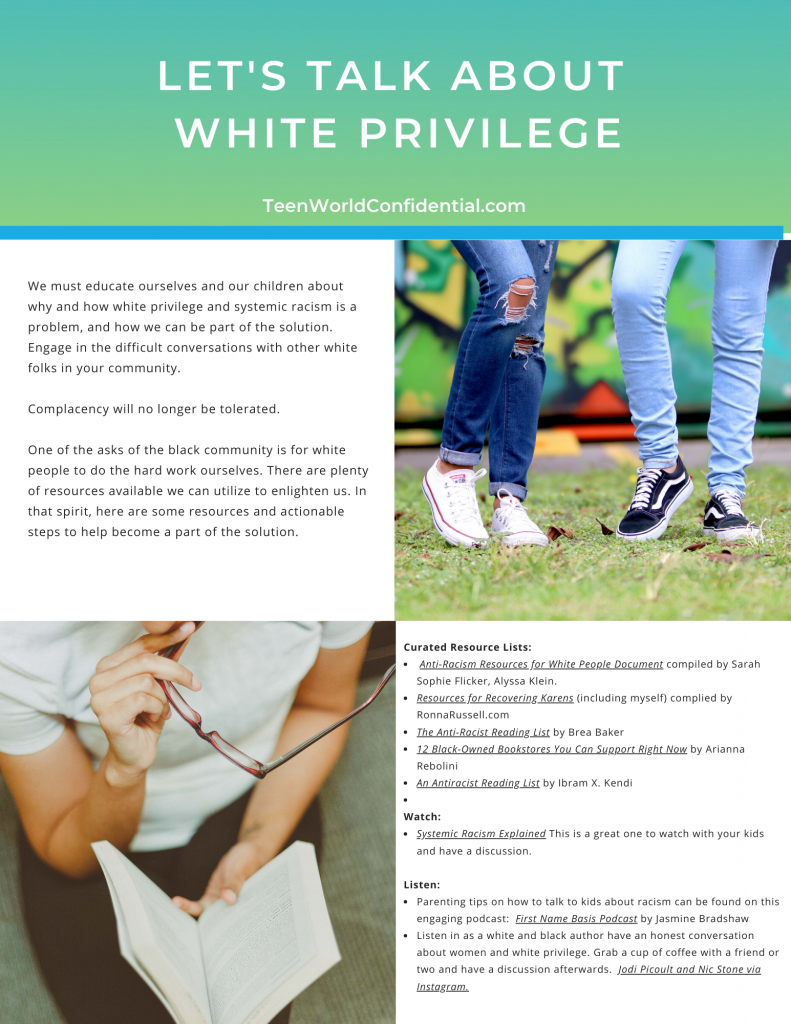
Difficult conversations spark change
Talking honestly and openly about white privilege in America ranks right up there with talking about sex. No one really wants to do it, but the mental, emotional, and physical health of our young people, and our society desperately depends on having these uneasy conversations. However, that’s where the similarity ends.
Difficult conversations between individuals who genuinely want to better themselves are stressful and uncomfortable. But it’s through that unease in which we genuinely change our perspectives, attitudes and beliefs — for the better.
The Black experience and systemic racism
It is long overdue that the black experience must be understood and appreciated. No longer can we shrug our shoulders and look away. No longer can we ignore the systemic racism that has been the foundation of our country. No longer can we be blinded by our whiteness to what is really happening to our black citizens.
Because I am not black, I cannot speak about the black experience. It is not my story to tell. However, it is my responsibility as a white woman and as a member of society to educate myself about the deep issues the black population has endured. Certainly I have always been very aware of the discrimination — we all have. But we have failed to recognize how insidious white privilege is within our society and the tremendous disadvantage it has on the black population; from education to medical care to job opportunities.
This matters when talking to our kids about the protests happening around the world. This is a conflicting, confusing, yet enlightening time for the adults. Can you imagine how your kids feel? But before you can talk to your kids, and you must, you have to understand how you feel, at least a little bit. As you assess your own emotions, keep in mind that kids are taking cues from you. They are not born racist — it is taught. Start the conversations now.

What can we do?
So, what can we do to help rid our country of systemic racism? I have spent hours poring over articles, opinion pieces, and podcasts to learn as much as I can, however this is only the beginning.
Understand the prevalence of white privilege in our society. White privilege is the unspoken understanding that the world is designed around the white experience. We don’t even think about the little nuances in our everyday activities. Do you need band-aids? Pantyhose? A new doll for your child? Let me guess, I bet your color choices are various shades of beige, not black or brown.
But it goes deeper than that. In the article What is White Privilege, Really? by Cory Collins found on tolerance.org, the author explains:
Basically, racial bias is a belief. Racism is what happens when that belief translates into action. For example, a person might unconsciously or consciously believe that people of color are more likely to commit crime or be dangerous. That’s a bias. A person might become anxious if they perceive a black person is angry. That stems from a bias. These biases can become racism through a number of actions ranging in severity, and ranging from individual- to group-level responses:
+ A person crosses the street to avoid walking next to a group of young black men.
+ A person calls 911 to report the presence of a person of color who is otherwise behaving lawfully.
+ A police officer shoots an unarmed person of color because he “feared for his life.”
+ A jury finds a person of color guilty of a violent crime despite scant evidence.
+ A federal intelligence agency prioritizes investigating black and Latino activists rather than investigate white supremacist activity.
In other words, if you are white, you are very often given the benefit of the doubt. If you are black, you are very often doubted. Consider how easy it makes the white experience compared to the black experience in day-to-day living.

“This too shall pass!” “Everything will be fine!”: White privilege and complacency
I can’t tell you how many times I’ve heard “this too shall pass” and “everything will be fine” during the pandemic, and now during the global protests.
Here’s the problem with that. Not only does that minimize the issues at hand, but it reflects white privilege. Yes, of course, in a few years these two major cataclysmic events will be in our history books. However, it is very important to realize that for many, many people this too shall not pass without repercussions, pain, and even death.
White privilege is the voice behind those patronizing words. Because so many people listened to political leaders crying “hoax” over the pandemic warnings and refuse to distance or wear masks, healthcare professionals are now risking their health to care for those sickened patients. Additionally, people of color are disproportionally affected by COVID-19. Taking an “everything will be fine” approach leads to complacency. And complacency leads to inaction. And inaction leads to silence.
“Throughout history, it has been the inaction of those who could have acted: the indifference of those who hold have known better; the silence of the voice of justice when it mattered most; that has made it possible for evil to triumph.”
Haile Selassie

When voices go unheard
The direct parallel between COVID-19 and the protests is the failure of our government to listen to the warnings and act appropriately, responsibly and quickly. When the government ignores cries for help, those cries become roars; they don’t disappear.
- When leaders ignore warnings and dismantle agencies ready to fight a devastating virus because they don’t want to deal with it, that’s a problem.
- When leaders ignore the warning of scientists to prepare for a health disaster that we haven’t seen in 100 years, that’s a problem.
- When a pandemic strikes and the African-American population is disproportionately affected, that’s a problem.
- When leaders are angered because someone quietly protests by “taking a knee” but does nothing to resolve the underlying issue, that’s a problem.
- When leaders dismiss the cries of black families about injustice, that’s a problem.
And here we are. These are no longer simple problems. They are now tremendous avalanches causing immeasurable social, economical, and medical destruction. The chorus of voices that have been ignored by political leaders are now challenging us to resolve the problems. Now.
There is only one way to resolve this anemic leadership response: Vote. Vote like your life depends on it. Because it does.

Let’s educate ourselves.
We have to understand the issues at hand. We must educate ourselves about why and how white privilege and systemic racism is a problem, and how we can be part of the solution. Start the difficult conversations with other white folks in your community. Complacency will no longer be tolerated..
One of the asks of the black community is for white people to do the hard work ourselves. There are plenty of resources available we can read to enlighten us. In that spirit, I have curated a PDF of helpful resources that you may download.
Here’s my challenge:
- Support and learn from the black community by reading books about the African-American experience, written by Black authors. This list and this list, An Antiracist Reading List by Ibram X. Kendi, are a great place to start. Organize a book discussion with neighborhood kids and parents.
- Donate to organizations that support initiatives to improve the black community.
- Recognize the subtle ways in which white privilege permeates your space. Talk about it with your kids.
- Vote. Help get people to the polls.
- Postcards2Wisconsin
- VoteSaveAmerica
- Support your local candidate, too! My local representative is Lauren Underwood. Feel free to support her, too!
- VOTE! If you are not registered, or know someone who is not, click here to register!
- Emily’s List supports Democratic women running for office.
- Read an article a day about systemic racism. Reflect on it. Share your thoughts about what you learned with another white person in your world — someone who is up for a challenge with you. Then take that new information and think about how you can teach what you learned to your kids.
Click on the photo for your free download of resources for you and your family. (For a printer-friendly version, click here.)
When we come together as a community we amplify our nation’s collective voices to demand action and change.



That was a timely and important newsletter, Kim! While it’s a difficult discussion to have with our children, those of us empty nesters must take this opportunity to educate ourselves and have those important conversations with our friends and family! We need to open our eyes and hearts to help fix the inequities that have become commonplace in our white privileged lives. We can make a difference! And I agree- first and foremost we need to get out there and vote. Find out about the candidates and get involved with campaigns. Thanks Kim – I am always there for a “talk”.